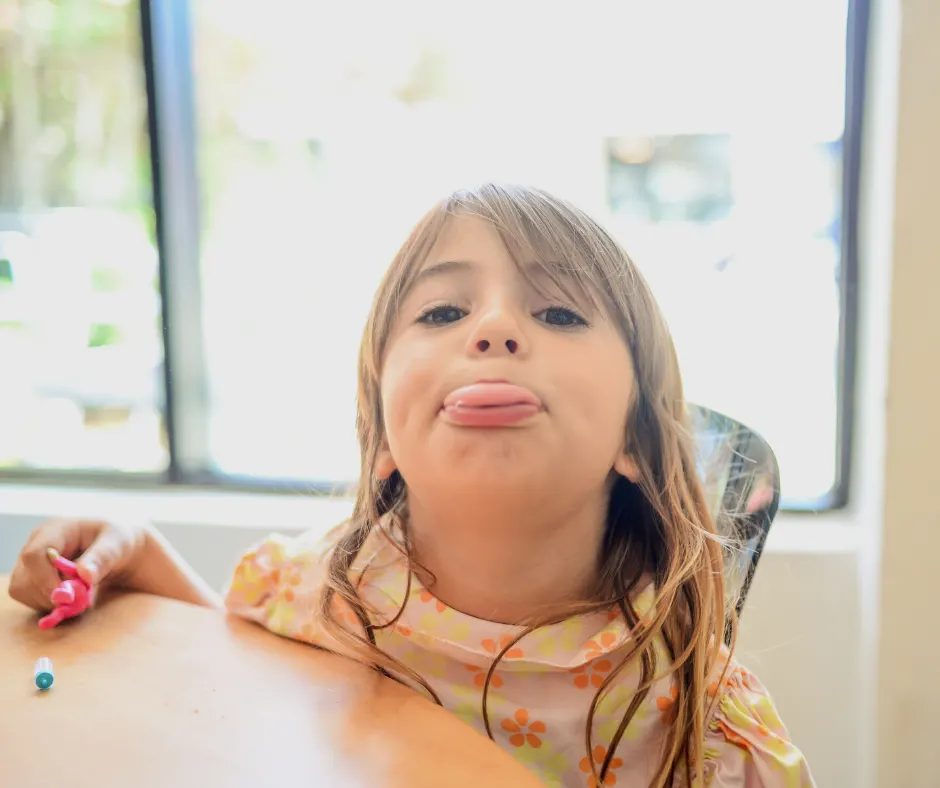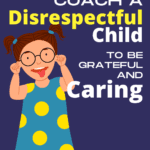Learn how to deal with an angry disrespectful child OR proactively teach your kid how to act in a respectful way with these easy parenting tips.
I spent years working in retail. In retail, you are exposed to every human interaction scenario possible. Things you never even dreamed of.
Even though the majority of my patrons were wonderful customers that I truly loved, there were always those few customers that would cause me to brace when I saw them approach our counter.
I could only describe this bad behavior with one word: disrespectful.
Folks who seemed to enjoy belittling people with verbal abuse, and had no regards for the other’s feelings. Those who say hurtful things in the heat of the moment.
You’ve seen them. I am sure of that.
I wasn’t necessarily angry with each disrespectful grown child I came across. I felt that they didn’t know better (no one taught them good manners), or something happened in their past to develop this rude behavior.
In fact, their sour looks and harsh words gave me two positive gifts.
First, the disrespectful behavior gave me super tough skin, like rock-hard impenetrable skin
Secondly, these made me realize I needed to teach my future kids what respect means.

Stop Raising a Disrespectful Kid
Now that I am raising three children of my own, the memories of those uncomfortable retail-related moments are tack-sharp.
I want to raise children who understand what respect truly means and the negative implications of disrespectful behavior.
Luckily, parents have a much greater impact on their children than you may think, but only if you have their respect. One recent study reported that teenagers are less likely to begin smoking if their parents express disapproval. Similar results were found in regards to drinking and doing drugs.
Whether you are raising a disrespectful child or want to avoid raising one, coach your family members towards good behavior in these 5 effective ways.
1) Respect is a TWO way Street
The first step in raising respectful children is to show your children respect.
When you talk down to them or label them as a “bad kid”, you are hurting their confidence and modeling disrespectful behavior. Your child’s behavior will reflect how you treat them.
Picture this: Your child is drinking milk in the living room and spills it on the couch. If you respond with “You are being so bad today, why would you think you could drink milk on the couch?”, you are teaching them to make assumptions about other people based on what they are doing.
If a waitress at a restaurant mistakenly gave your child regular milk instead of chocolate milk, you would not want them to respond with “You are the worst waitress, how could you forget something like that?”
When you respect them, you are teaching them to value both themselves and other people.
Related: How to Discipline a Defiant Child

2) Teach Them to Open Their Ears
Even many adult have trouble actually listening to others.
You do not have to state your opinion in every discussion. You do not have to argue if you do not agree. Sometimes the most appropriate response is to say nothing at all- and just listen.
The best way to do this is to model this behavior for them.
When they speak, make eye contact and listen with intention. Ask how your child feels. If you don’t agree with what they are saying, kindly acknowledge their views and explain your own.
Explain to them that everyone is entitled to their own views and opinions, and they can politely disagree or avoid unnecessary arguments if they do not share the same views.
Learn how to adjust your parenting style based on your kid’s personality type here.
3) Teach Empathy to Your Child
As a parent, you are only human. When you mess up, do not try to hide it from your child. You are not doing your child any favors by falsely impersonating the “perfect person”.
The best way to teach an angry disrespectful child is actually to apologize when YOU make mistakes, and forgive others when they mess up.
Sometimes after I unfairly lose my temper with my kids, I explain to them, “I am sorry I yelled. You didn’t mean to spill your milk. I am tired, but that is no excuse to yell so much.”
Read other benefits of apologizing to your kids here.
Explaining to them that people make mistakes, will help them come to terms with the reality of human nature.
These 5 social rules will help you teach your kid to be empathetic towards others. This will only become more important as they reach their teenage years.

4) Help Them Recognize When they feel Angry
Disrespectful behavior is often the outcome of your child’s anger.
Teach your child to recognize their own signs of anger so that they can pump their brakes when they feel it coming on. Help them identify physical signs of anger, such as:
- Sweating
- Clenching fists
- Rapid breaths
- Yelling
Explain to them that if they are feeling this way towards someone, it is best to walk away and take a deep breath before an outburst occurs.
This post and free workbook give children the tools to manage their own anger and other big feelings.
If your child does act in disrespectful ways, coach them through it by calmly asking them why they acted out, and what they could have done instead.

Related: How to Adjust your Body Language when Speaking to Your Kid
5) Discipline With Consequences
Avoid disciplining with threats and bribes. Instead, use natural and negative consequences to teach your kids right from wrong.
Learn all about Disciplining with natural consequences
Let’s say it is cold outside and your child refuses to put on a jacket (common scenario in young children). Instead of yelling at them and battling them to put on their coat, it’s a good idea to allow them to walk outside and feel the cold. They will most likely want to put their jacket on based on the natural consequence of going outside without a coat.
While a power struggle is a normal part of development, using logical consequences will help them truly understand right from wrong and a better way to communicate.
This will help them think through scenarios and act in appropriate ways.
For better communication at home, try banning these 5 “forbidden phrases“.
Final Thoughts on How to Deal with an Angry Disrespectful Child
These five simple tips will help you raise children who not only respect other people, but they also respect themselves.
This will be a huge driving factor behind their success and happiness even as they learn to cope with a teenage brain, then later grow into adulthood.
Next time your child displays respect and dignity when faced with a difficult situation, an important thing you can do is praise them for the good things they did.
If you learned learn how to deal with an angry disrespectful child OR proactively teach your kid how to act in a respectful way share it and follow us on Facebook.
If you think your child has other behavioral problems, has issues with authority figures, or shows signs of mental health issues, reach out to a family therapist or pediatrician as soon as possible.


teresa
Sunday 17th of July 2022
Kids today dont listen to their parents they want everything handed to them on a silver platter they dont care about manners or chores just gimme gimme gimme and all of this talking and asking the child either does what their told when they are told or they can deal with consequences teachers wont be interested in babying them parents are not suppose to be their child friend im tired of seeing kids throwing tantrums and hitting their parents and calling them names we cant wait until they are 16 years old 200 pounds to instill displine morals values in them it begins in the home when they are very young so when they are grown they will know how to act in public and keep a job and respect their elders and have a work ethic schools and bosses will not tolerate any less from them i saw an enlisted man with his young kids at a big box store when they wouldnt come to him he sternly told them to and he counted to 3 they knew he would follow through so they didnt let him get to that point this is what kids need faithfully enforced rules and displine at all times a time and a place for every purpose under heaven even play and bedtime stories
Raise Kids who Lift up Other Kids, Not Put Them Down - Simply Rooted Family
Monday 11th of April 2022
[…] the growing minds of children, including the best ways to raise grateful kids, happy kids, and respectful kids– (You can click to […]
How to Raise Assertive Kids who Command Respect - Simply Rooted Family
Wednesday 6th of April 2022
[…] You may also like: How to Teach Kids to Be Respectful […]
How to Raise the Type of Sons that Girls Want to Bring Home to Mama - Simply Rooted Family
Wednesday 6th of April 2022
[…] Read: 5 Ways to Raise Respectful Kids […]
Winifred
Monday 19th of April 2021
I really loved this article. Thank you for sharing these tips. Very relevant not only for raising kids but organizing homes and families in general. Certainly going to share this anchoring routines thing with my family members.